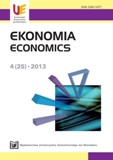O realistyczności założeń, falsyfikowalności hipotez i innych modernistycznych mitach współczesnej ekonomii
The realism of assumptions, falsifiability of hypotheses and other modernist myths of contemporary economics
Author(s): Bartosz ScheuerSubject(s): Economy
Published by: Wydawnictwo Uniwersytetu Ekonomicznego we Wrocławiu
Keywords: methodology of economics; philosophy of science; economic crisis; ontological realism; modernism
Summary/Abstract: In the face of the global economic crisis, there are many opinions according to which economics as a science needs major rebuilding. Usually, it is emphasized that it should not be developed by involving the construction of formal, mathematical models but that there is a need to improve the “realisticness” of analysis. Based on the analysis of a dispute between P. Krugman and J.H. Cochrane it can be said that the arguments which appear during the debate on the crisis are not new and confusingly similar to those that already appeared in the 30s and 70s of the last century. It should also be noted that both: the supporters of “realisticness” of economic analysis, as well as representatives of the mainstream formalism treat this crisis as a confirmation of the correctness of their theories and evidence of the weakness of the concepts proposed by their opponents. The article is placed in relation to the thesis that all the arguments that have emerged in the debate on the state of the economic theory after the crisis, contrary to appearances, do not bring anything new to the economic discourse and cannot lead to any solutions of the theoretical dispute, because all arguments are based on the same philosophical foundations. In other words it can be said that the basic problem of modern economics should not be considered as a weakness of theory, but as a weakness of philosophy common to all participants of the discourse. First of all, in fact, the arguments coming from both sides of the dispute seem to assume that the ultimate and decisive test of any theory is its confrontation with experience, the “facts”, whereby the test is perceived in terms of the correspondence theory of truth. This means that both: economists, whose views on the nature of the theory are similar to those presented by P. Krugman, as well as their opponents, who, like J.H. Cochrane recognize that any theoretical concepts should meet fairly strict formal requirements and finally take the form of (usually mathematicised) model, assume that carrying out such a test is possible firstly, and secondly, that it boils down to a comparison of propositions that make up the model/theory (assumptions and predictions, or only prediction) with the reality whose components are independent of theory and processes of cognition.
Journal: Ekonomia
- Issue Year: 2013
- Issue No: 25
- Page Range: 64-76
- Page Count: 13
- Language: Polish

